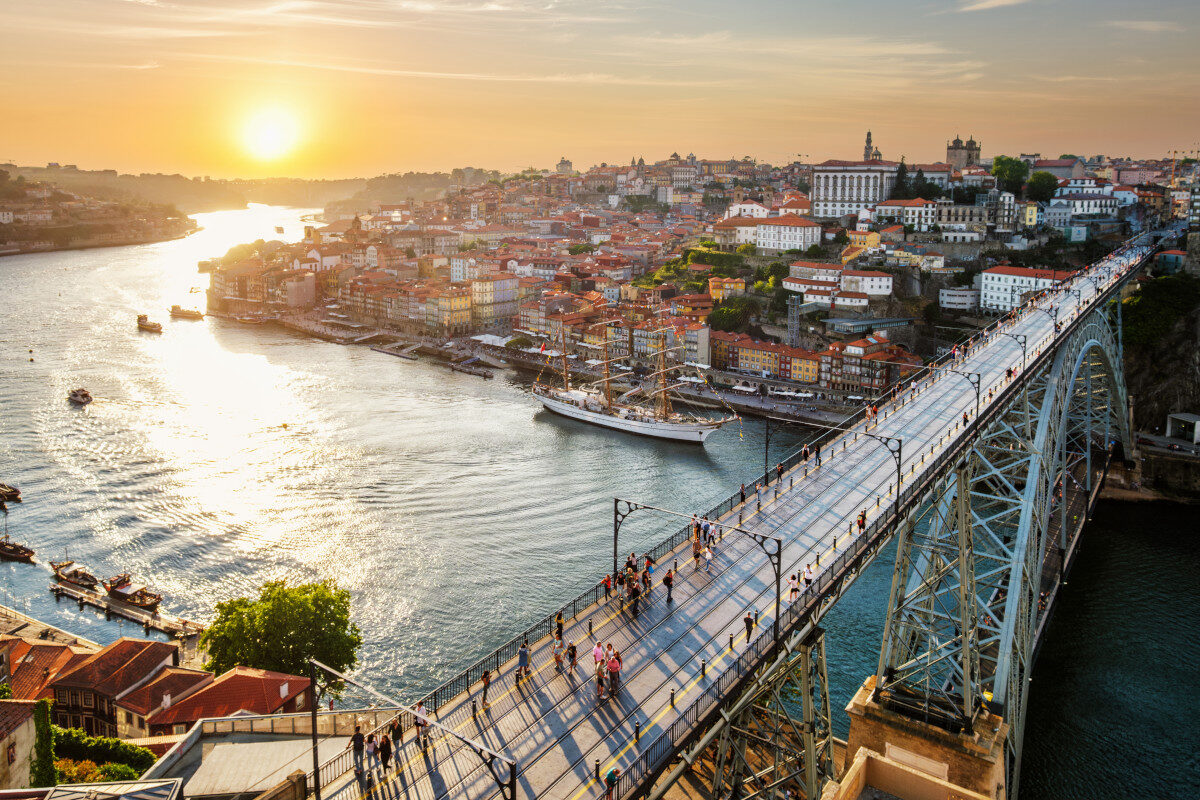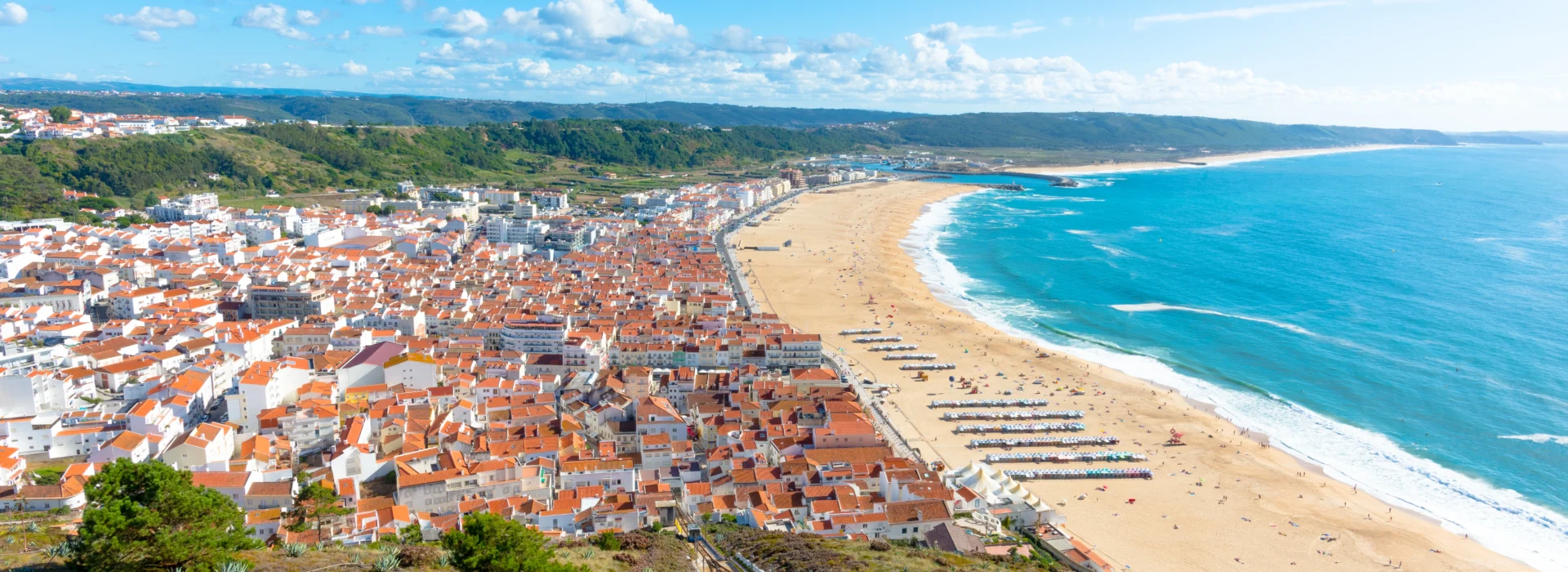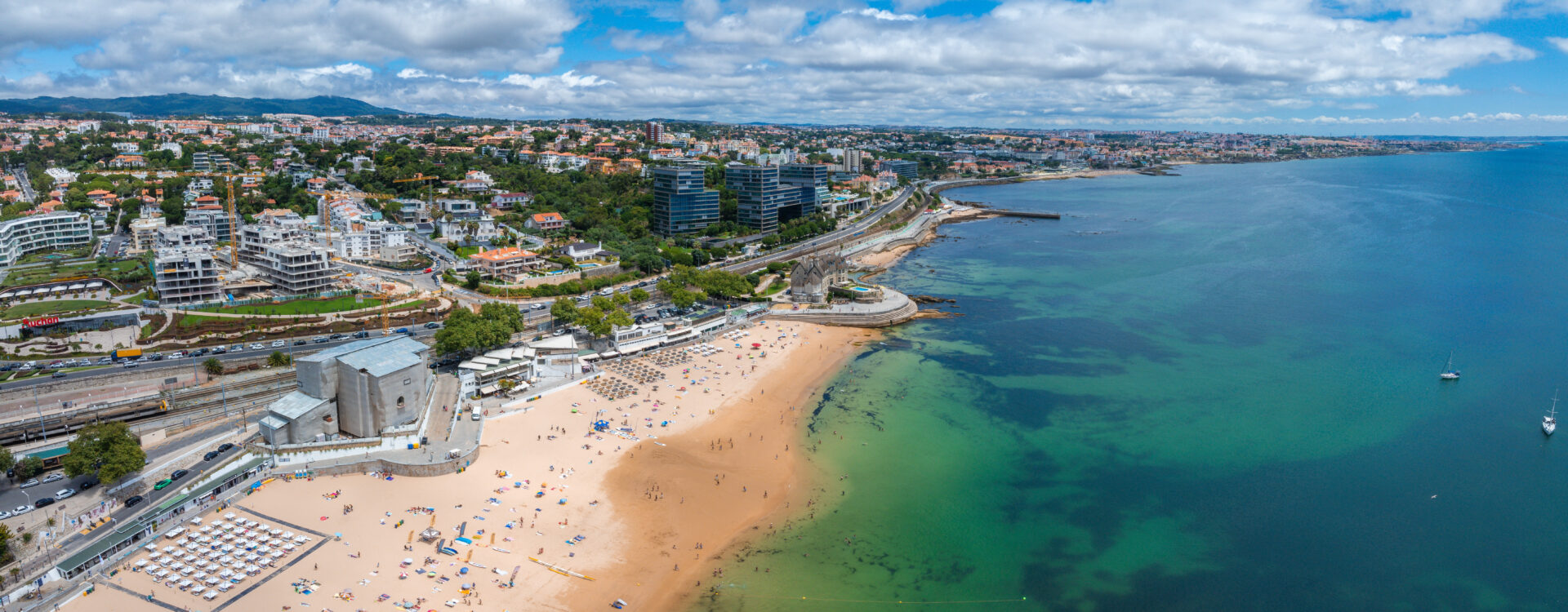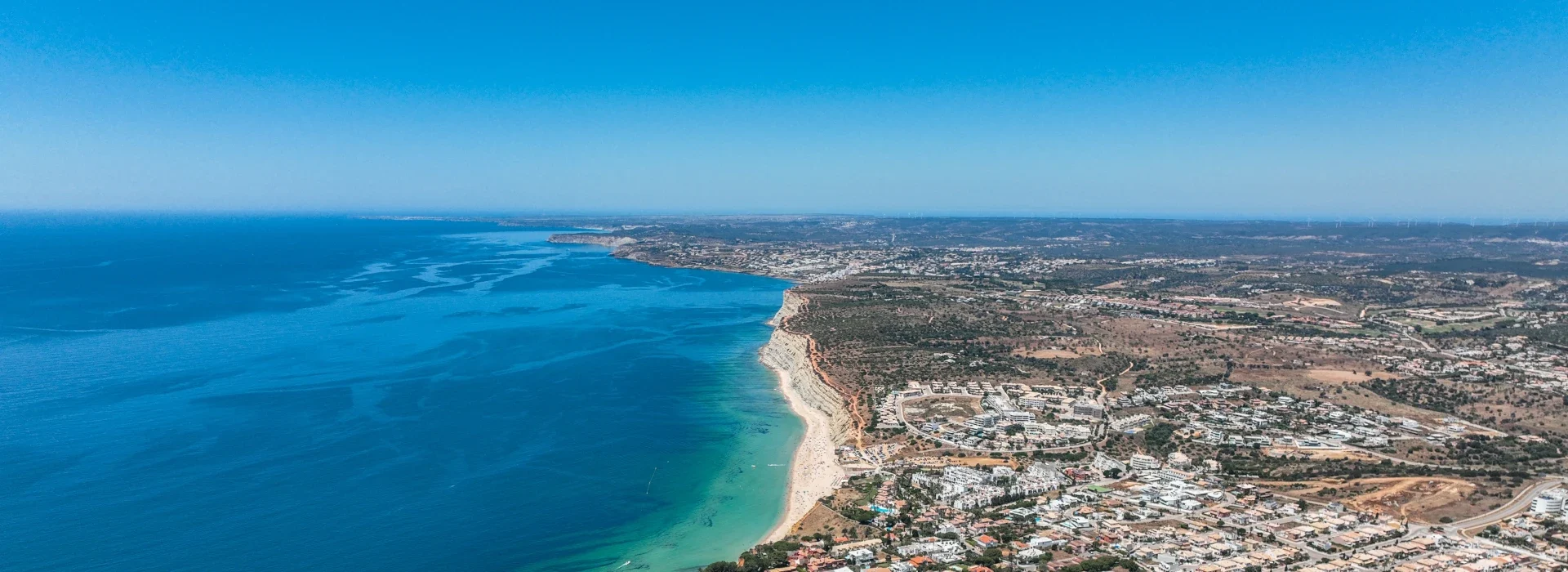Relocating from the USA to Portugal
Moving from the United States to Portugal offers the chance to experience a slower pace of life, personal safety, and a welcoming culture. Portugal is a well-established destination for U.S. citizens seeking a balanced lifestyle in Europe.
This guide explains what Americans should know before relocating — from visa and residency options to taxes, healthcare, and cultural adaptation. It also explores where U.S. citizens are choosing to settle and how daily life compares with that in the United States.
For a broader perspective on life in Portugal, including housing, healthcare, education, and legal procedures, see our full Moving to Portugal guide.

Talk to our Team
Table of Contents
Portugal and the United States: A Long-Standing Relationship
Portugal and the United States share one of the world’s oldest continuous diplomatic partnerships, founded on mutual respect, cooperation, and shared democratic values. Formal relations began in the late 18th century and continue today through collaboration in trade, defence, and global policy.
These historical ties contribute to the ease with which Americans approach relocation to Portugal from the US. English is commonly understood in major cities and tourist areas, and U.S. citizens benefit from clear visa pathways, tax agreements, and strong consular support through the U.S. Embassy in Lisbon and regional consulates.
An established American community in Portugal further strengthens cultural and social connections, helping newcomers integrate and feel at home in their new surroundings.
Why Are Americans Moving to Portugal?
Current Trends, Motivations, and Numbers of U.S. Citizens
Relocation to Portugal from the USA has become an appealing option for Americans seeking stability, safety, and a high quality of life. Portugal’s affordability, mild climate, and straightforward residency options make it an attractive destination for retirees, remote professionals, and investors alike.

According to official Portuguese statistics (INE and GEE, using data from AIMA – the Agency for Integration, Migration and Asylum), the number of U.S. citizens with legal residence in Portugal rose from approximately 14,000 in 2023 to nearly 21,000 in 2024 — an increase of around 50 percent in one year.
This trend highlights Portugal’s reputation as one of Europe’s most attractive destinations for international residents, known for its balanced lifestyle, welcoming communities, and opportunities for both living and investment.
(Source: Instituto Nacional de Estatística (INE – Portugal’s national statistics office) and Gabinete de Estratégia e Estudos (GEE – the Ministry of Economy’s research and policy unit), using data reported by AIMA (Agency for Integration, Migration and Asylum), 2024)
Specific Attractions for Americans
-
Accessible visa options – including the D7 (retirement or passive income visa) and the Digital Nomad visa (D8), alongside other residence pathways available to foreign nationals.
-
Lower costs of healthcare and education compared with the United States, with access to Portugal’s national healthcare system for legal residents and a wide range of respected international schools.
-
Updated fiscal incentives for new residents, following the closure of the former Non-Habitual Resident (NHR) regime and the introduction of the IFICI (Incentive for Scientific Research and Innovation) program, aimed at qualified professionals and innovators.
-
Mild climate and scenic coastal lifestyle, appreciated for its gentle weather and varied landscapes, from the Atlantic coast to inland regions.
-
High safety standards and low crime rates, consistently placing Portugal among the safest countries in Europe.
-
Rich cultural heritage, historic cities, and free movement within the Schengen Area, providing excellent connectivity for travel, business, and lifestyle mobility.
Key Differences When Moving to Portugal from the USA
Cost of Living Comparison
Portugal generally offers a lower cost of living than major U.S. cities such as New York, San Francisco, or Miami. Housing, groceries, dining, and healthcare tend to be more affordable, allowing residents to maintain a comfortable lifestyle on a moderate budget.
Healthcare and Insurance Systems
Portugal’s public healthcare system (SNS) provides accessible and affordable care for legal residents. Private health insurance is also available for those seeking faster access or broader coverage. Compared with the United States, healthcare costs in Portugal are substantially lower, while maintaining high standards of care.
Work–Life Balance and Pace of Life
Work–life balance is an integral part of daily life in Portugal. The rhythm is generally slower than in the U.S., with a stronger emphasis on family time, community, and leisure. Extended lunch breaks and generous holiday periods are a regular feature of the Portuguese working culture.
Public Transport vs. Car Dependency
Major cities such as Lisbon and Porto have well-developed and reliable public transportation networks, reducing the need for private vehicles. Residents appreciate the convenience of trains, metros, and buses — a contrast to the car-dependent lifestyle found in much of the United States.
Safety, Community, and Lifestyle
Portugal consistently ranks among the safest countries in the world. Violent crime is rare, and a strong sense of local community contributes to daily life. Residents value the relaxed pace, access to outdoor activities, and a rich cultural calendar throughout the year.
Cultural Adaptation and Expectations
Although Portugal is welcoming to newcomers, cultural differences do exist. Building personal relationships and trust takes time and plays a key role in both business and social contexts. Learning basic Portuguese, even when English is widely understood, helps foster smoother integration and everyday interactions.
Visa and Residency Options for U.S. Citizens
Portugal offers several visa pathways for U.S. citizens planning long-term relocation. Each option is designed for specific personal or professional circumstances and includes clear residency requirements.
D7 Visa (Passive Income)
The D7 Visa is well suited to retirees or individuals with passive income from pensions, investments, or savings. It provides a route to residency in Portugal without the need for local employment.
Digital Nomad Visa
Created for remote professionals and freelancers who earn income from outside Portugal, the Digital Nomad Visa allows individuals to live in the country while continuing their online work.
D2 Visa (Entrepreneur)
The D2 Visa is designed for entrepreneurs or investors establishing a business in Portugal. Applicants must submit a viable business plan and demonstrate sufficient financial resources to support the project.
Residency Permits: Timeline and Requirements
Visa processing typically takes around 60 to 90 days, followed by an in-person appointment at a Portuguese consulate. Upon arrival, residents must register with AIMA (Agency for Integration, Migration and Asylum) to obtain their residence permit.
Note: Proposed changes to Portugal’s nationality law may significantly increase the required period of legal residence for citizenship, but these changes are still pending constitutional review and are not yet in force.
Taxes and Double Taxation Agreements (U.S.–Portugal)
The United States and Portugal maintain a double taxation treaty that helps prevent individuals from being taxed twice on the same income. U.S. citizens are required to continue filing annual tax returns with the Internal Revenue Service (IRS), even while residing abroad.
The former Non-Habitual Resident (NHR) regime, which offered preferential tax treatment on certain types of foreign income, was closed to new applicants in 2024. Those who already hold NHR status may retain its benefits for the remainder of their 10-year eligibility period.
New residents may qualify for other fiscal incentives, such as the IFICI (Incentive for Scientific Research and Innovation) program, depending on their professional activity and eligibility.
How to Move to Portugal from the U.S.: Step-by-Step
Relocation to Portugal from the U.S. involves several key steps, from visa preparation to housing and banking. This step-by-step outline helps Americans planning their move to Portugal understand the essential documents, processes, and practical arrangements required for a smooth transition.
Pre-Move Checklist Specific for Americans
- Confirm your visa eligibility and select the most appropriate option
- Gather all required documents, including proof of income, an FBI background check, and valid health insurance
- Plan your housing and financial arrangements before arrival
- Research healthcare and schooling options if relocating with family
Applying for a Visa (Specific Documents and Requirements)
Each visa category has its own documentation and eligibility criteria. Common requirements include:
- Proof of income or employment
- Background checks
- Evidence of accommodation in Portugal
- Private health insurance coverage
Finding Housing Remotely from the U.S.
You can begin your property search using Portuguese real estate websites or through relocation consultants who assist with long-term rentals. Renting before purchasing is often a practical approach, allowing time to explore different neighbourhoods and understand the local market.
Shipping Belongings and Customs
It is advisable to use international movers familiar with U.S.–Portugal shipping regulations. Customs procedures require detailed inventories, and certain items may be subject to VAT or import restrictions.
Getting a NIF and Opening a Portuguese Bank Account
The NIF (Número de Identificação Fiscal) is a personal tax identification number required for most contracts, banking, and essential services in Portugal. Opening a Portuguese bank account is typically necessary for rent payments, utilities, and visa applications.

Talk to our Team
Where Americans Are Living in Portugal
When moving to Portugal from the USA, American residents tend to settle in areas that balance quality of life, accessibility, and community. The following regions are among the most established choices for U.S. citizens living in Portugal.
Lisbon and Cascais
Lisbon, the capital, is a leading choice among American residents. The city combines historic architecture, modern infrastructure, and an active international community. Nearby Cascais offers a relaxed coastal lifestyle with convenient access to Lisbon.

Porto
Porto, known for its riverside views and wine heritage, offers a slightly lower cost of living than Lisbon. The city has a growing international community and a vibrant cultural scene.

Algarve
The Algarve is known for its beaches, golf courses, and year-round sunshine. The region is popular with retirees from the United States thanks to its relaxed atmosphere and the availability of English-speaking services.

Madeira
The island of Madeira offers subtropical weather throughout the year and striking natural landscapes. It attracts remote workers, retirees, and others seeking a peaceful yet connected lifestyle.
Silver Coast and Other Popular Areas
The Silver Coast, stretching from Lisbon to Coimbra, features scenic coastal towns with fewer tourists and lower living costs. Places such as Nazaré and Peniche appeal to surfers, digital professionals, and families looking for an authentic coastal environment.
Communities with Significant American Presence
Lisbon, Cascais, Porto, and the Algarve host established American communities that offer social groups, support networks, and cultural activities across the country.
Cost of Living: Portugal vs. USA
The cost of living in Portugal is generally lower than in the United States, though expenses vary depending on location and lifestyle. Housing, transportation, groceries, and healthcare tend to be more affordable, particularly outside major urban centres.
Housing (Comparison with Major US Markets)
Renting a one-bedroom apartment in Lisbon’s city centre typically costs between €1,000 and €1,800, considerably less than similar apartments in cities such as New York or San Francisco. Coastal towns and inland areas often provide lower rental prices and property costs.
Groceries and Dining
Groceries and restaurant meals are usually more affordable in Portugal. A meal at a mid-range restaurant costs around €15–€25 per person, offering good value compared with U.S. prices.
Healthcare and Insurance
Public healthcare fees are modest for residents. Private health insurance plans generally range from €50 to €150 per month, depending on coverage and provider.
Utilities and Services
Monthly utility bills for electricity, water, and internet usually range from €100 to €150 for a typical apartment, lower than average U.S. household costs.
| Category | Portugal (Average) | USA (Average) |
| Rent (1BR City Center) | €1,000 | $2,500+ |
| Private Health Insurance | €100/month | $400–$600/month |
| Utilities | €120/month | $200+/month |
| Dining Out | €20 per meal | $40–$60 per meal |
| Public Transport | €40/month pass | $120+/month (metro card) |
Sources: Instituto Nacional de Estatística (INE – Portugal’s national statistics office) and OECD (Organisation for Economic Co-operation and Development) data. Estimated 2025 averages for illustrative comparison purposes.
Healthcare and Insurance for U.S. Citizens in Portugal
Public vs. Private Healthcare
Portugal’s public healthcare system (SNS) offers affordable medical services to legal residents, though waiting times for non-urgent procedures can vary. Private insurance can be used to complement public coverage and provide faster access to certain treatments or facilities.Insurance Options for American Expats
Private health insurance plans are available from various providers and are often required when applying for a visa. International health policies that include coverage in multiple countries can also be an option for frequent travellers.Medicare Considerations While Abroad
Medicare does not cover medical expenses outside the United States. Retirees living in Portugal typically arrange local or international health insurance to ensure adequate coverage.What to Expect in Terms of Quality and Access
Portugal’s healthcare system is consistently well rated by international health organisations. Major cities feature modern hospitals, clinics, and English-speaking doctors, with a high overall standard of care.Medications and Prescriptions
Prescription medicines are widely available through local pharmacies, often at lower prices than in the U.S. Some medications may require a Portuguese doctor’s prescription.Education and Schooling (For Families)
Families moving from the United States will find a range of education options in Portugal, from local public schools to private and international institutions that follow American or international curricula.Public and Private Options
Public education in Portugal is free for residents, though instruction is primarily in Portuguese. Private and international schools are concentrated in major urban areas and offer smaller class sizes and additional language options.International and American Curriculum Schools
Schools offering American curricula and International Baccalaureate (IB) programs operate mainly in Lisbon, Cascais, and Porto. These institutions provide English-language education recognised internationally.Credit/Diploma Transfers
Credit or diploma recognition is managed by the Portuguese Directorate-General for Higher Education (DGES). International schools often assist families through this process to ensure smooth academic transitions.Colleges and Universities: Equivalencies
Portugal’s universities are recognised across Europe, and many offer courses in English. U.S. students may transfer credits or participate in exchange programs through bilateral agreements or individual assessments.Taxes for Americans Living in Portugal
Understanding how taxation works is essential when relocating to Portugal from the United States. American citizens are subject to both U.S. and Portuguese tax obligations, and careful planning helps ensure compliance and avoid double taxation.IRS Obligations and FATCA
U.S. citizens must continue to file annual tax returns with the Internal Revenue Service (IRS), even while residing abroad. The Foreign Account Tax Compliance Act (FATCA) requires U.S. taxpayers to report certain foreign bank accounts and financial assets to the IRS.How Portugal Taxes Foreign Income
Portugal applies worldwide taxation to individuals considered tax residents in the country. In some cases, specific income types may benefit from reduced rates or exemptions under Portugal’s fiscal frameworks.Overview of the NHR and the New IFICI Regime
Portugal’s Non-Habitual Resident (NHR) regime, which for over a decade offered preferential tax treatment to eligible foreign residents — including reduced taxation on pensions, royalties, and other qualifying income — was closed to new applicants in early 2024.
Individuals who obtained NHR status before that date may continue to benefit from its provisions for the remainder of their original ten-year period, provided they maintain eligibility and Portuguese tax residency.
To replace the NHR, Portugal introduced the Incentive for Scientific Research and Innovation (IFICI), sometimes referred to as “NHR 2.0.”
This new framework is designed to attract qualified professionals, researchers, and entrepreneurs in innovation-driven fields, offering targeted tax reductions on qualifying income.
Although more selective than the former NHR, the IFICI regime reflects Portugal’s ongoing strategy to encourage international talent and investment in research and innovation.
(Source: Portuguese State Budget Law 2024; AIMA / AT / Diário da República)
Social Security Treaties
The United States and Portugal have a bilateral social security agreement that prevents double contributions and protects workers who divide their careers between both countries. The agreement allows qualifying periods to be combined when applying for benefits.Working With a Tax Advisor Specialized in American Taxation
It is advisable to work with a tax advisor experienced in both U.S. and Portuguese taxation to ensure proper compliance and identify potential advantages under the double taxation treaty.Investments and Bank Accounts: Reporting Requirements
Foreign bank accounts and investment holdings may need to be reported to the IRS using FBAR and FATCA forms. A clear understanding of these obligations is essential to maintain compliance and avoid potential penalties.Maintaining U.S. Connections While in Portugal
Living in Portugal does not mean losing touch with life in the United States. From voting and banking to staying connected with family and familiar media, there are several ways to maintain practical and cultural ties while abroad.Voting from Abroad
As an American citizen residing in Portugal, you can vote in U.S. federal elections through an absentee ballot. The Federal Voting Assistance Program (FVAP) provides the necessary resources and guidance for overseas voters.Banking and Financial Services
It is common for U.S. residents in Portugal to keep their American bank accounts and credit cards for convenience. A Portuguese bank account is typically required for local transactions such as rent, utilities, or salary deposits.Accessing U.S. Streaming and Digital Services
Streaming platforms such as Netflix, Amazon Prime, and Hulu are available in Portugal, though regional content may differ. A VPN may help maintain access to certain U.S. digital libraries when travelling or living abroad.Keeping U.S. Credit History Active
Continuing to use U.S. credit cards and making regular payments helps preserve your American credit history. Some residents choose international credit cards with no foreign transaction fees for added flexibility.Time Zone Considerations for Work and Family
Portugal operates on Western European Time (WET), five to eight hours ahead of the United States depending on the region. Remote workers and families often adapt schedules to manage communication across time zones.Driving and Transportation in Portugal
Getting around Portugal is generally straightforward, whether using public transport or driving. The country’s compact size and reliable infrastructure make both local and regional travel convenient.Exchanging a U.S. Driver’s License
U.S. citizens can exchange their driver’s licence for a Portuguese one within 90 days of obtaining residence, without taking a driving test, provided their U.S. state of issue has a reciprocal agreement with Portugal.Renting or Buying a Car
Car rental is simple with a valid international driver’s permit. Purchasing a vehicle follows standard registration procedures, and vehicle prices are typically higher than in the U.S. due to import and ownership taxes.Public Transport Options
Portugal offers efficient public transportation systems in major cities and across regions. Metro networks, buses, and trains are affordable and reliable, reducing the need for personal car ownership.Differences in Traffic Rules and Driving Habits
Driving is on the right-hand side, as in the U.S., though speed limits and alcohol tolerance levels are generally stricter. Roundabouts are common, and parking in central urban areas can be limited.Cultural Differences and Everyday Life
Adjusting to Portuguese culture can take time but is often a rewarding part of settling in. Everyday life combines traditional customs with a relaxed pace that many newcomers appreciate.Social Norms and Customs
Portuguese culture values politeness and respect. Greetings often include a handshake or a kiss on both cheeks among acquaintances. Building trust is important in both personal and professional relationships.Language and Communication
Although English is widely understood in urban areas, learning basic Portuguese expressions demonstrates respect and helps integration into local life.Bureaucracy and Patience
Administrative processes in Portugal can take time. Patience, organisation, and familiarity with local procedures make transitions smoother when dealing with official matters.Making Local Connections
Participating in local events, language classes, or community activities is an effective way to meet people and feel connected. Expat groups and neighbourhood associations often organise gatherings for newcomers.Celebrating American Holidays and Traditions in Portugal
Thanksgiving dinners, Fourth of July gatherings, and other American holidays are often celebrated within expatriate circles. Some international schools and churches also hold events to mark these occasions.American Communities and Support in Portugal
Several established communities and organisations across Portugal help Americans settle in, build social connections, and share practical advice about living abroad.Where to Meet Other Americans
Lisbon, Cascais, Porto, and the Algarve are home to active American communities. These areas host regular meetups, professional networking events, and cultural activities throughout the year.Community Groups and Events
Online platforms such as Facebook groups, Meetup.com, and InterNations are useful for finding events, local networks, and practical support during the relocation process.Online Forums and Resources
Websites such as ExpatExchange and Reddit’s r/expats provide peer advice, community discussions, and personal insights for Americans living in Portugal.American Associations and Clubs
Organisations like the American Club of Lisbon and international chambers of commerce promote cultural exchange and networking opportunities for U.S. citizens and other international residents.Useful Contacts and Resources
The following official resources and contacts are useful for U.S. citizens planning or completing their relocation to Portugal. They provide reliable information on immigration, taxation, healthcare, and essential administrative matters.U.S. Embassy and Consulates
- U.S. Embassy in Lisbon – provides assistance with passports, voting, and emergency services.
- Consulates in Ponta Delgada (Azores) and Funchal (Madeira) – offer regional support and citizen services.
Official Government Websites
- AIMA (Agency for Integration, Migration and Asylum – formerly SEF): https://aima.gov.pt/pt
- Portuguese Tax Authority (AT): https://www.portaldasfinancas.gov.pt/
- National Health Service (SNS): https://www.sns.gov.pt/
Relocation Advisors and Expat-Friendly Services
Professional relocation advisors can assist with visa preparation, housing, and other aspects of settling in Portugal.Translation and Document Support Services
Certified translators are required for official documents such as birth or marriage certificates, academic diplomas, and legal records.Common Challenges and How to Overcome Them
Relocating to another country involves a period of adjustment. The points below highlight common challenges faced by newcomers from the United States and suggest ways to manage them effectively.Language Barriers
While English is widely understood in urban areas, learning Portuguese greatly improves daily communication and helps build meaningful connections with local communities.Cultural Adjustment
Cultural norms, business etiquette, and administrative procedures may differ from those in the United States. Staying open-minded and observing how things are done locally helps ease the transition.Bureaucratic Hurdles Specific to Americans
Tasks such as banking, tax registration, or visa renewals can be time-consuming. Working with professionals experienced in both U.S. and Portuguese systems simplifies procedures and prevents delays.Homesickness and Emotional Adaptation
Keeping in touch with family and participating in local or expatriate communities can help reduce feelings of homesickness. Engaging in cultural and social activities fosters a sense of belonging in your new environment.Get Help With Your Move to Portugal
Relocating internationally involves careful planning — from visa applications and housing searches to understanding tax obligations and practical setup. For those moving to Portugal from the USA, we help simplify the process by connecting you with experienced local professionals who can guide each step of your relocation. To explore your options or receive tailored guidance, get in touch to be introduced to a trusted relocation specialist.
Talk to our Team
Frequently Asked Questions
This section answers common questions from Americans planning to move to or live in Portugal, covering practical, legal, and cultural aspects of relocation.What are the best areas in Portugal for American expats to settle?
The most established areas among American residents include Lisbon and Cascais, known for their amenities and international schools; Porto, valued for its culture and lower living costs compared with Lisbon; and the Algarve, offering a coastal lifestyle and active expatriate networks. Smaller towns on the Silver Coast and the island of Madeira appeal to those seeking quieter surroundings and close access to nature.What is work culture like in Portugal, and what job opportunities are available for Americans?
Work culture in Portugal emphasises balance, collaboration, and respect for personal time. There are more public holidays and a generally slower pace than in the United States. Job opportunities exist in technology, tourism, hospitality, and remote work. Portuguese language skills expand options for on-site roles, while remote professionals often apply through the D8 digital nomad visa route.How should I manage U.S. finances and taxes while living in Portugal?
Keep your U.S. bank accounts active and open a Portuguese account for local transactions. Be aware of American tax filing obligations such as FBAR, FATCA, and worldwide income reporting, and how these interact with Portuguese tax laws. Professional advice from a cross-border tax specialist helps ensure compliance in both countries.What bureaucracy should Americans expect when relocating to Portugal?
Key steps include obtaining a NIF (tax identification number), opening a Portuguese bank account, applying for a visa through a Portuguese consulate, and attending an appointment with AIMA after arrival to receive your residence permit. Processing times vary, so it is best to begin early and keep certified copies of all important documents.Do Americans need health insurance to live in Portugal?
Health insurance is required when applying for a residence visa. Applicants must show proof of medical coverage valid in Portugal, typically through a private insurance policy. After obtaining residency, foreign residents can register with the national health service (SNS) and may choose to maintain private insurance for faster access or broader coverage.What do American retirees need to know about moving to Portugal?
Retirees commonly apply for the D7 visa, demonstrating stable passive income and accommodation in Portugal. The country offers affordable living costs, a favourable climate, and access to high-quality healthcare. It is advisable to review pension taxation, healthcare registration, and residence renewal requirements before relocating.How can I prepare for cultural differences between the U.S. and Portugal?
Life in Portugal tends to follow a more relaxed rhythm, with longer mealtimes and strong family and community ties. Punctuality is valued but interactions are less hurried than in the U.S. Learning Portuguese helps integration and makes daily life easier.What is the process for shipping personal belongings and clearing customs?
Use a reputable international moving company and prepare a detailed inventory of your items. Confirm eligibility for duty exemptions on used household goods and coordinate with Portuguese customs before shipping. Check which items are restricted and ensure your shipment is insured for transit.This guide was prepared with care to provide clear, factual information based on official Portuguese sources such as AIMA (Agência para a Integração, Migrações e Asilo), AT (Autoridade Tributária e Aduaneira), SNS (Serviço Nacional de Saúde), IMT (Instituto da Mobilidade e dos Transportes), and INE (Instituto Nacional de Estatística). While we aim to keep content current, readers should always confirm details with official institutions or qualified professionals when planning their move.















